The quiet maneuvering began almost immediately after Republican Sen. Johnny Isakson of Georgia announced he'd retire at year's end: name drops, phone calls, subtle and not-so-subtle pleas for support.
Now, amid speculation over whom Gov. Brian Kemp might appoint to replace Isakson until a special election is held, some hopefuls are raising their hands for consideration.
One of those prominent contenders is Rep. Doug Collins, who has emerged as one of President Donald Trump's chief defenders in Congress through his role as the top Republican on the House Judiciary panel.
But what exactly Kemp is looking for in a replacement is still largely unknown.
The Republican governor — sidetracked by Hurricane Dorian barreling up the Eastern Seaboard — has said little publicly. That's despite being inundated by politicians and their supporters contacting him about the seat, according to an official familiar with the conversations who was not authorized to discuss deliberations and spoke on condition of anonymity.
Isakson said he plans to step down in December. Whomever Kemp appoints will serve for about 10 months before a special election on Nov. 3, 2020, for the remaining two years of Isakson's term.
Georgia's other senator, Republican David Perdue, is also defending his seat on the November 2020 ballot. The two open Senate seats have raised Georgia's status as a must-watch 2020 battleground.
There will be no primary elections for Isakson's seat, meaning the special election will be open to qualified candidates from all political parties. That could significantly increase the likelihood of a runoff, required by Georgia law if no candidate receives over 50% of the vote.
Republican strategists say other potential candidates include U.S. Rep. Tom Graves and statewide officers like Lt. Gov. Geoff Duncan and Attorney General Chris Carr.
When asked about Isakson's seat in a recent interview, Collins told The Associated Press: "If the governor were to ask me, would I like to take that position and begin that cycle? I would say yes."
Collins acknowledged that he has discussed the seat with Kemp, saying, "We had a short conversation that dealt with more than that."
Collins has used his role on the Judiciary panel to criticize continued efforts by Democrats to investigate special counsel Robert Mueller's report on Russian election interference and obstruction of justice. While Collins has generally been well liked by lawmakers on both sides, he has become more confrontational since Democrats won the House majority and he ascended to the top GOP spot on the committee.
"This year, because of the majority's dislike of this president, the endless hearings into a closed investigation have caused us to accomplish nothing except talk about the problems our country is facing," Collins said in July as Mueller testified before the panel.
At the same time, he has worked with Democrats on legislation in the past. Collins, a former pastor, worked with New York Rep. Hakeem Jeffries on legislation to reform federal sentencing and prison laws that was eventually signed by Trump last year.
Brian Robinson, a Republican political adviser in Georgia who served as communications director under former Gov. Nathan Deal, says that several members of Georgia's congressional district have a "leg up" in seeking the appointment because they have the proven campaigning ability and fundraising network needed in such a short sprint.
Robinson said that Collins' relationship with the president could give him a big advantage.
"Donald Trump likes Doug, and if Donald Trump weighs in for Doug, that's going to be very persuasive," Robinson said.
Associated Press writer Mary Clare Jalonick contributed to this report from Washington.
UNITED NATIONS (AP) — The United States vetoed a widely backed U.N. resolution Thursday that would have paved the way for full United Nations membership for Palestine, a goal the Palestinians have long sought and Israel has worked to prevent.
The vote in the 15-member Security Council was 12 in favor, the United States opposed and two abstentions, from the United Kingdom and Switzerland. U.S. allies France, Japan and South Korea supported the resolution.
The strong support the Palestinians received reflects not only the growing number of countries recognizing their statehood but almost certainly the global support for Palestinians facing a humanitarian crisis caused by the war in Gaza, now in its seventh month.
The resolution would have recommended that the 193-member U.N. General Assembly, where there are no vetoes, approve Palestine becoming the 194th member of the United Nations. Some 140 countries have already recognized Palestine, so its admission would have been approved, likely by a much higher number of countries.
U.S. deputy ambassador Robert Wood told the Security Council that the veto “does not reflect opposition to Palestinian statehood but instead is an acknowledgment that it will only come from direct negotiations between the parties."
The United States has “been very clear consistently that premature actions in New York — even with the best intentions — will not achieve statehood for the Palestinian people,” deputy State Department spokesman Vedant Patel said.
His voice breaking at times, Palestinian U.N. Ambassador Riyad Mansour told the council after the vote: “The fact that this resolution did not pass will not break our will and it will not defeat our determination.”
“We will not stop in our effort,” he said. “The state of Palestine is inevitable. It is real. Perhaps they see it as far away, but we see it as near.”
This is the second Palestinian attempt for full membership and comes as the war in Gaza has put the more than 75-year-old Israeli-Palestinian conflict at center stage.
Palestinian President Mahmoud Abbas first delivered the Palestinian Authority’s application for U.N. membership in 2011. It failed because the Palestinians didn’t get the required minimum support of nine of the Security Council’s 15 members.
They went to the General Assembly and succeeded by more than a two-thirds majority in having their status raised from a U.N. observer to a non-member observer state in 2012. That opened the door for the Palestinian territories to join U.N. and other international organizations, including the International Criminal Court.
Algerian U.N. Ambassador Amar Bendjama, the Arab representative on the council who introduced the resolution, called Palestine’s admission “a critical step toward rectifying a longstanding injustice" and said that “peace will come from Palestine’s inclusion, not from its exclusion.”
In explaining the U.S. veto, Wood said there are “unresolved questions” on whether Palestine meets the criteria to be considered a state. He pointed to Hamas still exerting power and influence in the Gaza Strip, which is a key part of the state envisioned by the Palestinians.
Wood stressed that the U.S. commitment to a two-state solution, where Israel and Palestine live side-by-side in peace, is the only path for security for both sides and for Israel to establish relations with all its Arab neighbors, including Saudi Arabia.
“The United States is committed to intensifying its engagement with the Palestinians and the rest of the region, not only to address the current crisis in Gaza, but to advance a political settlement that will create a path to Palestinian statehood and membership in the United Nations,” he said.
Mansour, the Palestinian U.N. ambassador, reiterated the commitment to a two-state solution but asserted that Israel believes Palestine "is a permanent strategic threat."
"Israel will do its best to block the sovereignty of a Palestinian state and to make sure that the Palestinian people are exiled away from their homeland or remain under its occupation forever,” he said.
He demanded of the council and diplomats crowded in the chamber: “What will the international community do? What will you do?”
Israeli-Palestinian negotiations have been stalled for years, and Israel’s right-wing government is dominated by hard-liners who oppose Palestinian statehood.
Israeli U.N. Ambassador Gilad Erdan called the resolution “disconnected to the reality on the ground” and warned that it “will cause only destruction for years to come and harm any chance for future dialogue.”
Six months after the Oct. 7 attack by the Hamas militant group, which controlled Gaza, and the killing of 1,200 people in “the most brutal massacre of Jews since the Holocaust,” he accused the Security Council of seeking “to reward the perpetrators of these atrocities with statehood.”
Israel’s military offensive in response has killed over 32,000 Palestinians, according to Gaza’s health ministry, and destroyed much of the territory, which speaker after speaker denounced Thursday.
After the vote, Erdan thanked the United States and particularly President Joe Biden “for standing up for truth and morality in the face of hypocrisy and politics.”
He called the Palestinian Authority — which controls the West Bank and the U.S. wants to see take over Gaza where Hamas still has sway — “a terror supporting entity.”
The Israeli U.N. ambassador referred to the requirements for U.N. membership – accepting the obligations in the U.N. Charter and being a “peace-loving” state.
“How can you say seriously that the Palestinians are peace loving? How?” Erdan asked. “The Palestinians are paying terrorists, paying them to slaughter us. None of their leaders condemns terrorism, nor the Oct. 7 massacre. They call Hamas their brothers.”
Despite the Palestinian failure to meet the criteria for U.N. membership, Erdan said most council members supported it.
“It’s very sad because your vote will only embolden Palestinian rejectionism every more and make peace almost impossible,” he said.
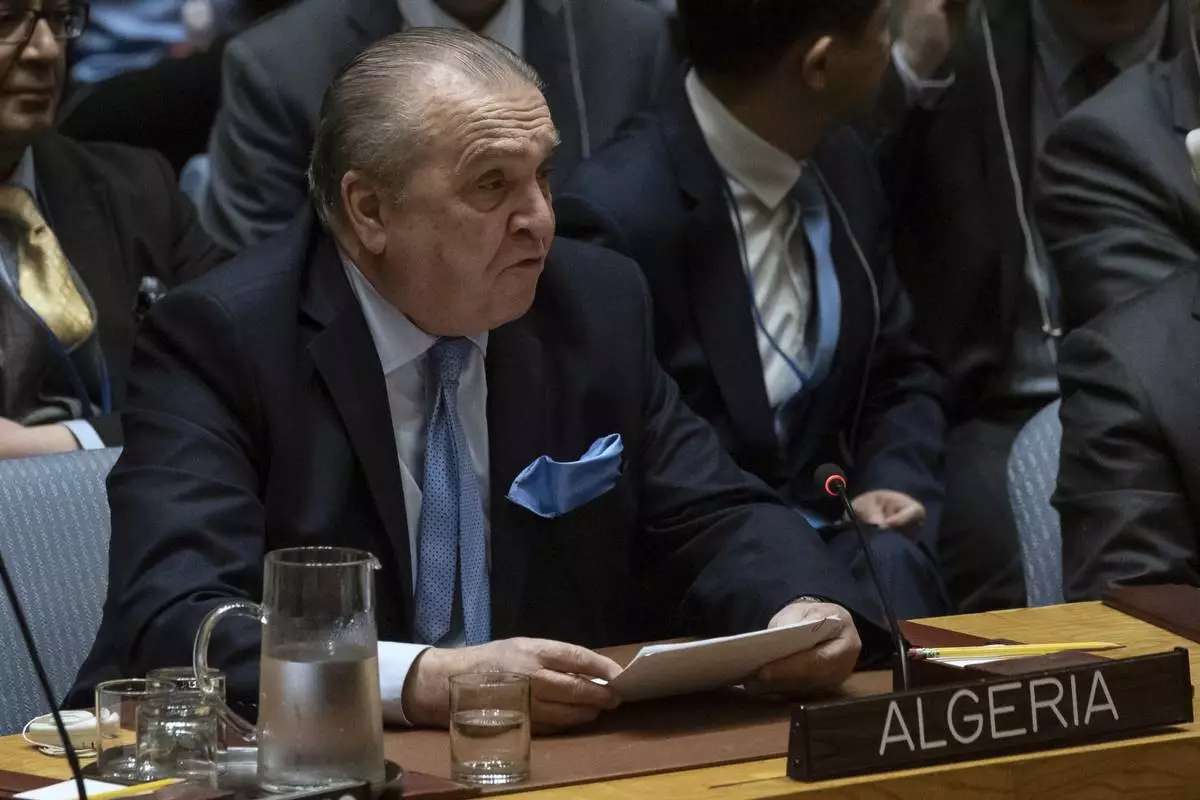
Algeria's Permanent Ambassador to the United Nations Amar Bendjama speaks during a Security Council meeting at United Nations headquarters, Thursday, April 18, 2024. (AP Photo/Yuki Iwamura)
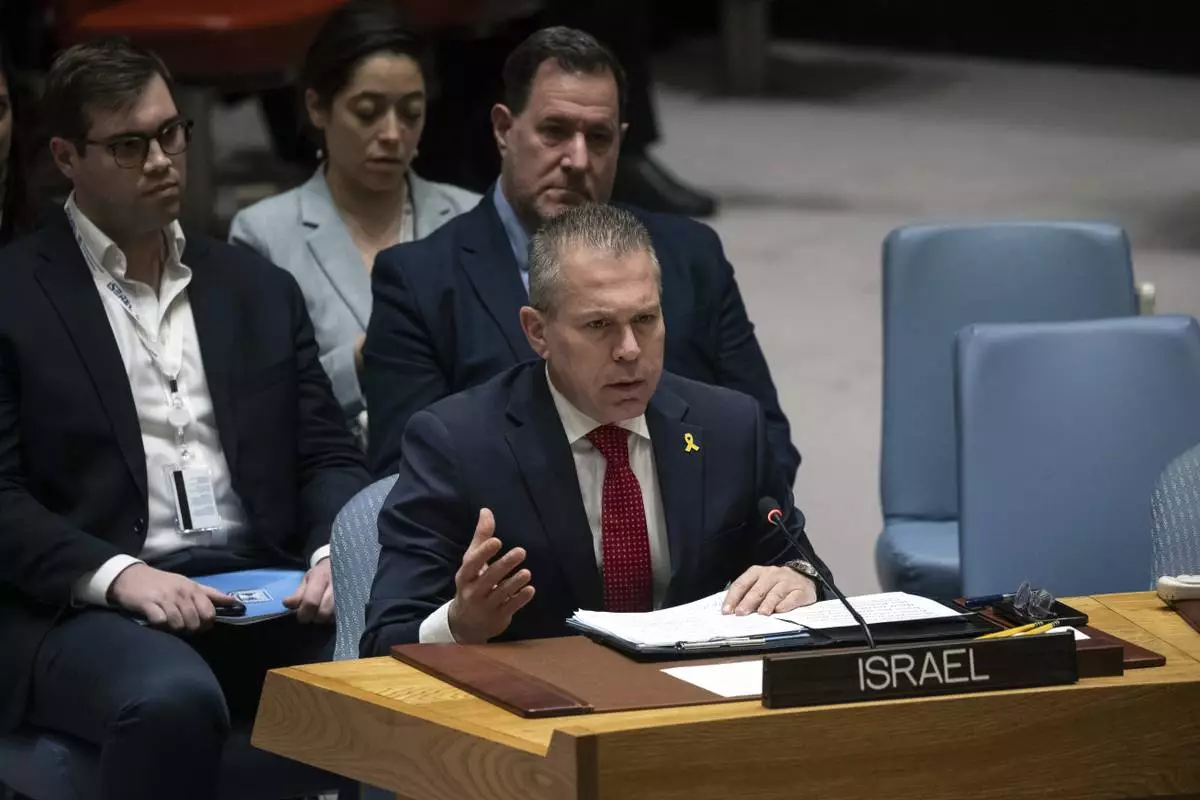
Israeli Ambassador to the United Nations Gilad Erdan speaks during a Security Council meeting at United Nations headquarters, Thursday, April 18, 2024. (AP Photo/Yuki Iwamura)
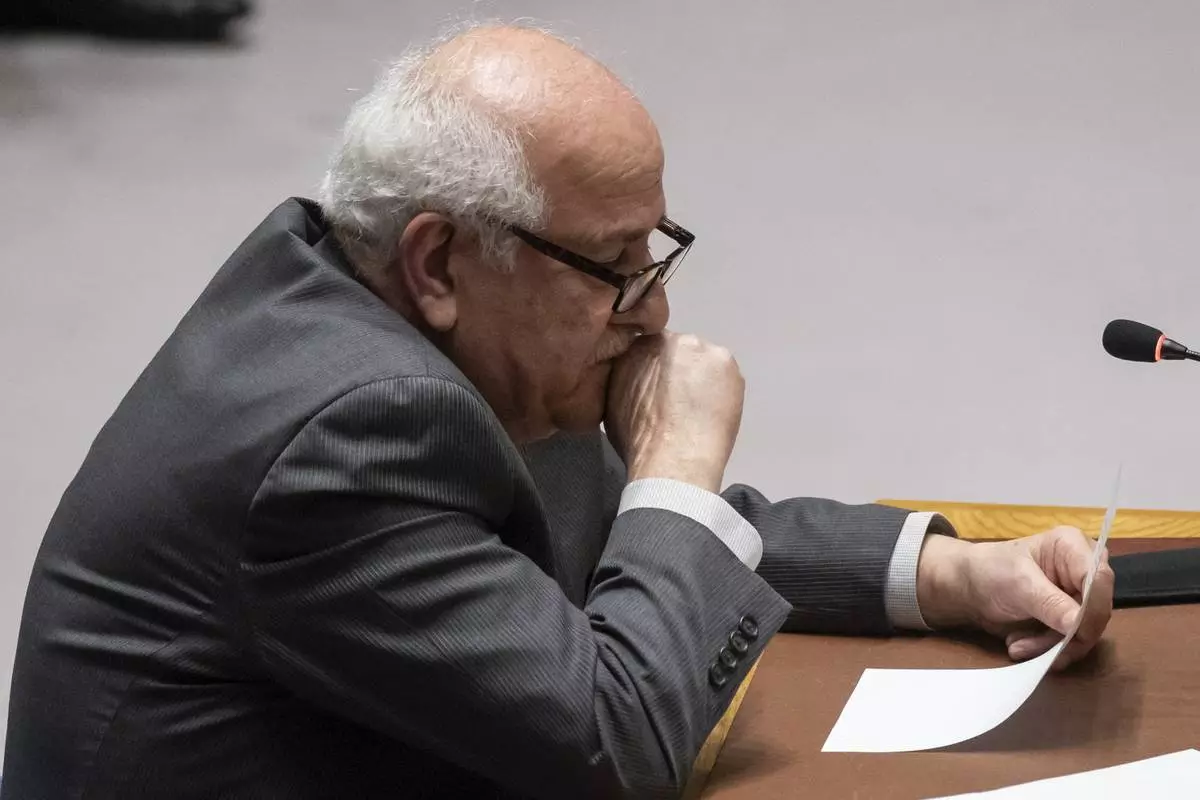
Palestinian Ambassador to the United Nations Riyad Mansour holds tears while speaking during a Security Council meeting at United Nations headquarters, Thursday, April 18, 2024. (AP Photo/Yuki Iwamura)
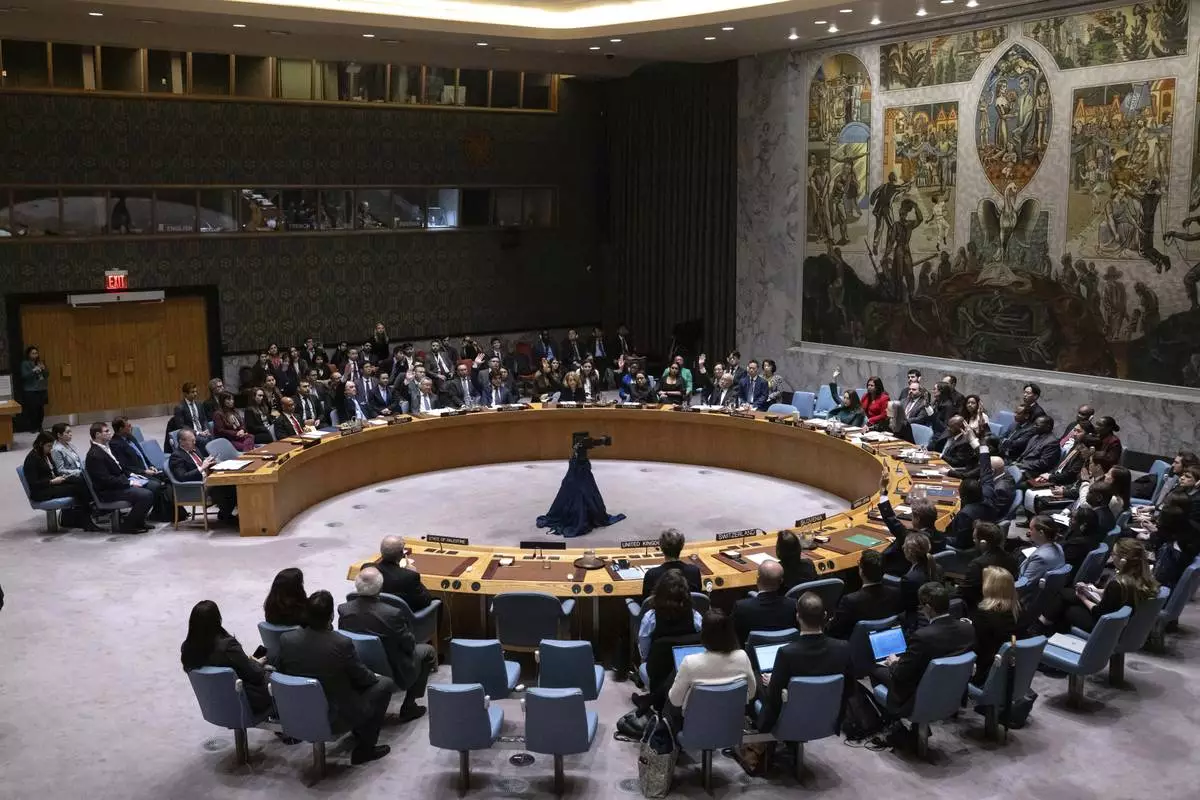
Representatives of member countries take votes during a Security Council meeting at United Nations headquarters, Thursday, April 18, 2024. (AP Photo/Yuki Iwamura)
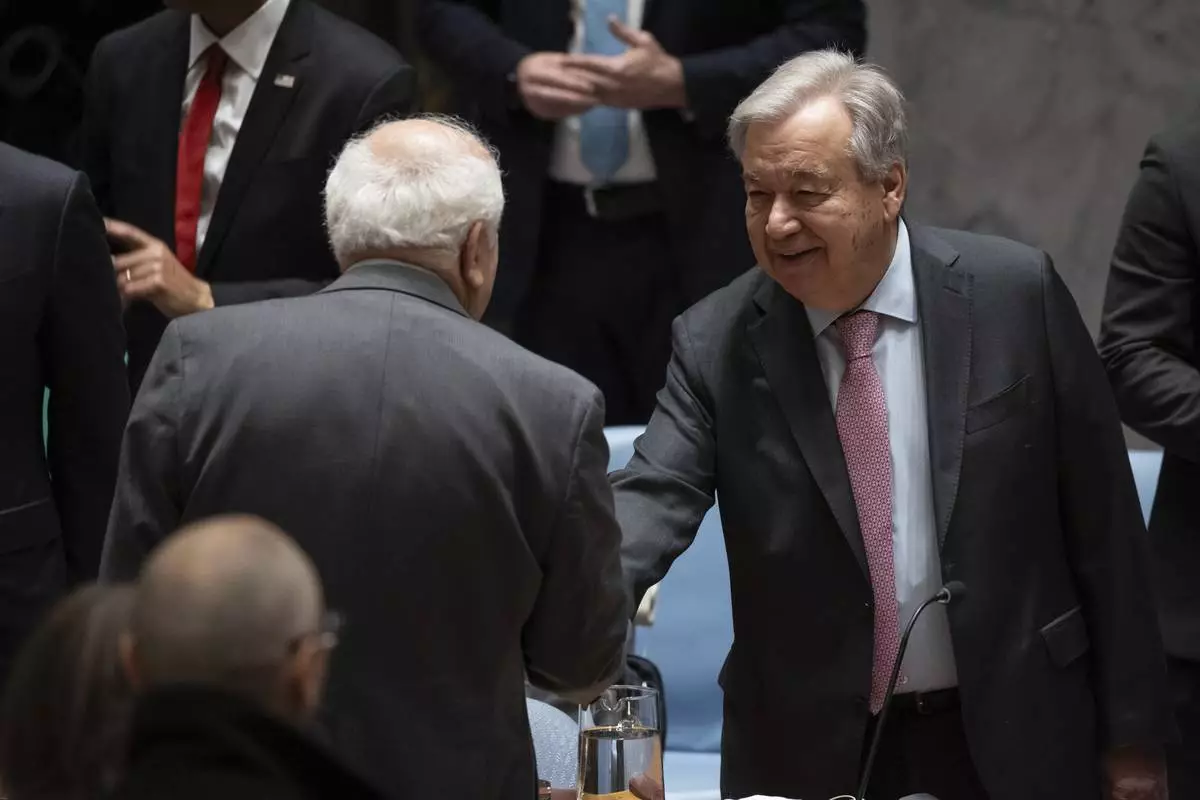
Palestinian Ambassador to the United Nations Riyad Mansour, left, and United Nations Secretary-General Antonio Guterres speak before a Security Council meeting at the United Nations headquarters, Thursday, April 18, 2024. (AP Photo/Yuki Iwamura)
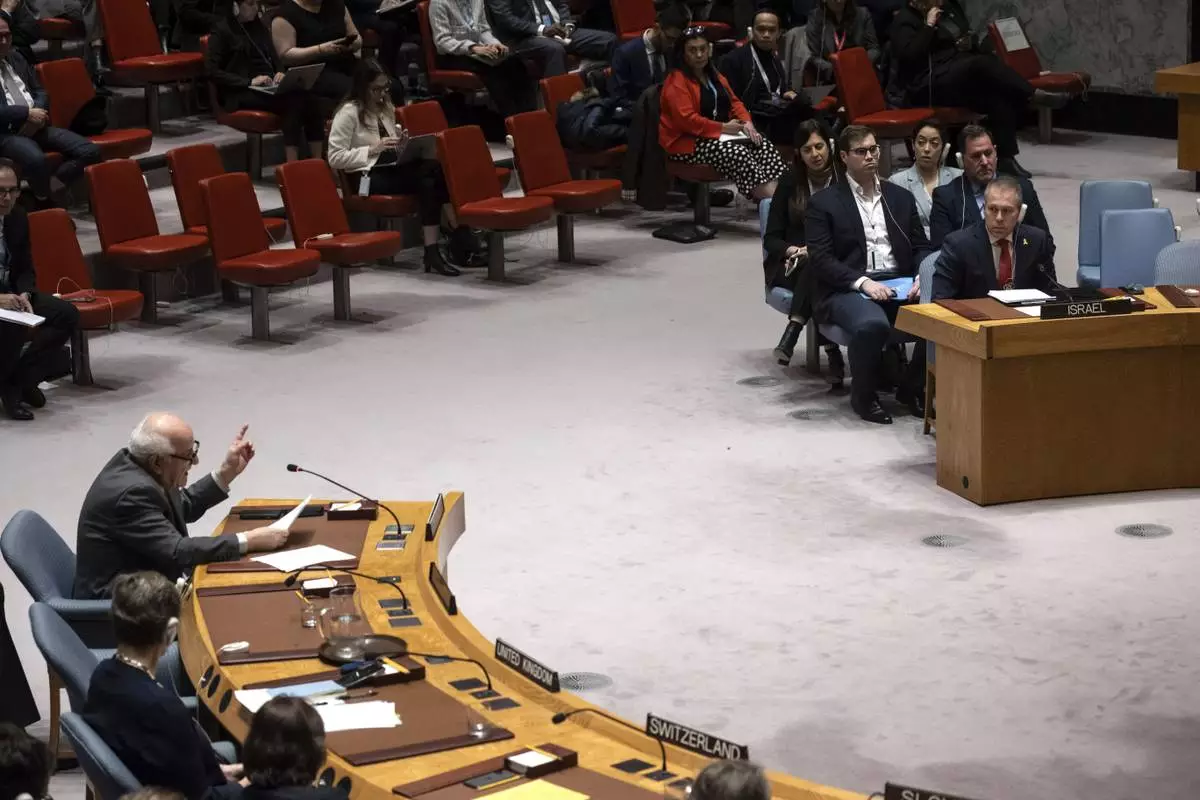
Palestinian Ambassador to the United Nations Riyad Mansour speaks during a Security Council meeting at United Nations headquarters, Thursday, April 18, 2024. (AP Photo/Yuki Iwamura)
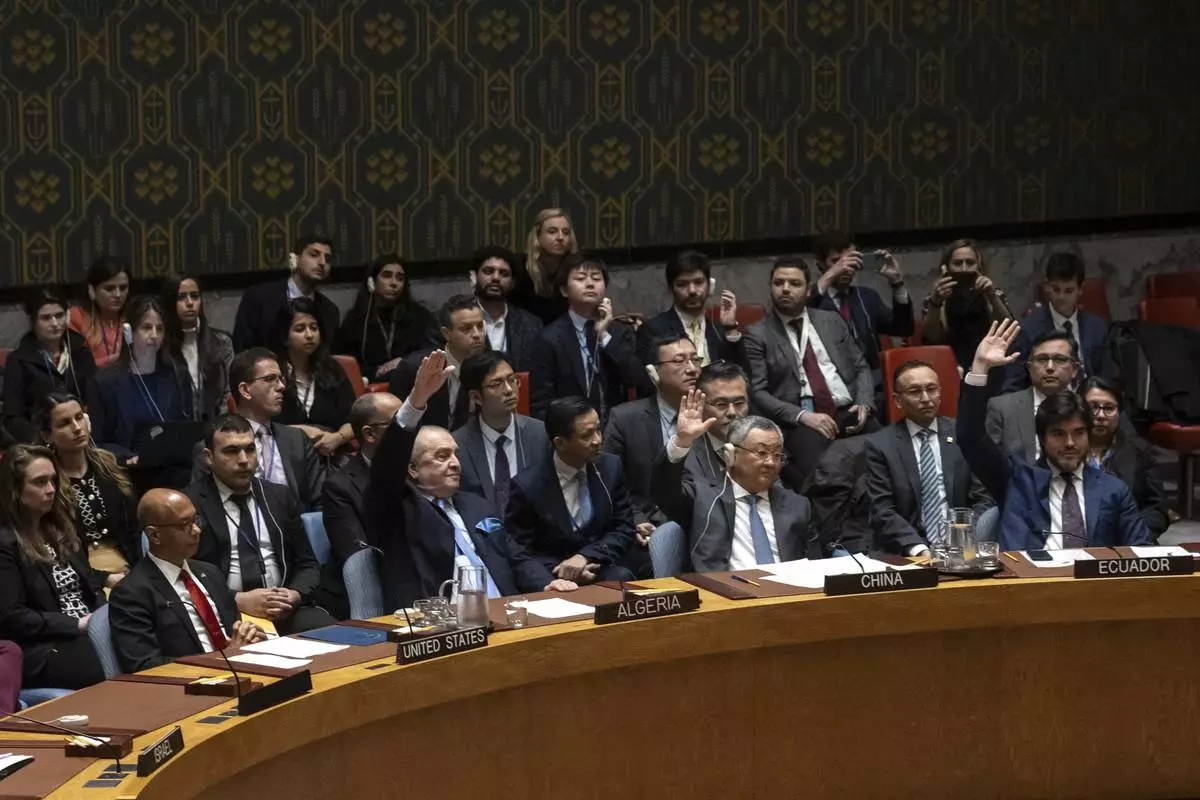
Representatives of member countries take votes during a Security Council meeting at United Nations headquarters, Thursday, April 18, 2024. (AP Photo/Yuki Iwamura)
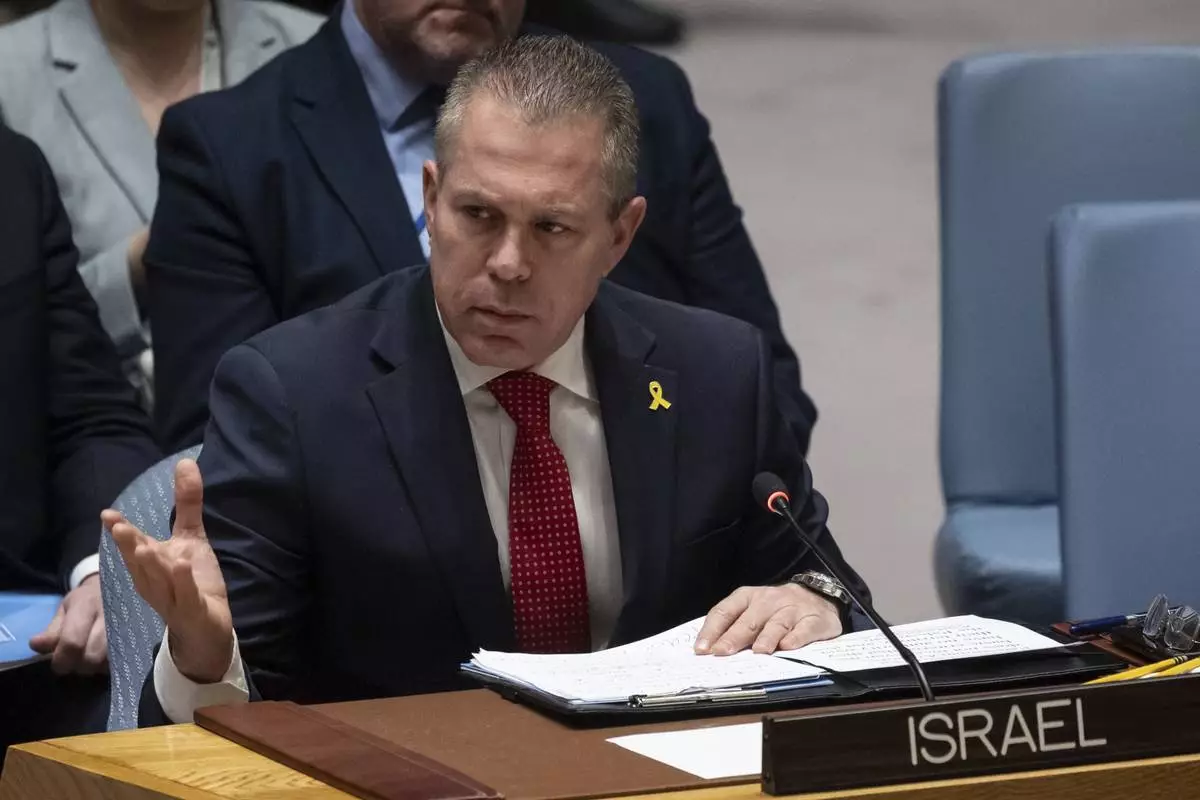
Israeli Ambassador to the United Nations Gilad Erdan speaks during a Security Council meeting at United Nations headquarters, Thursday, April 18, 2024. (AP Photo/Yuki Iwamura)
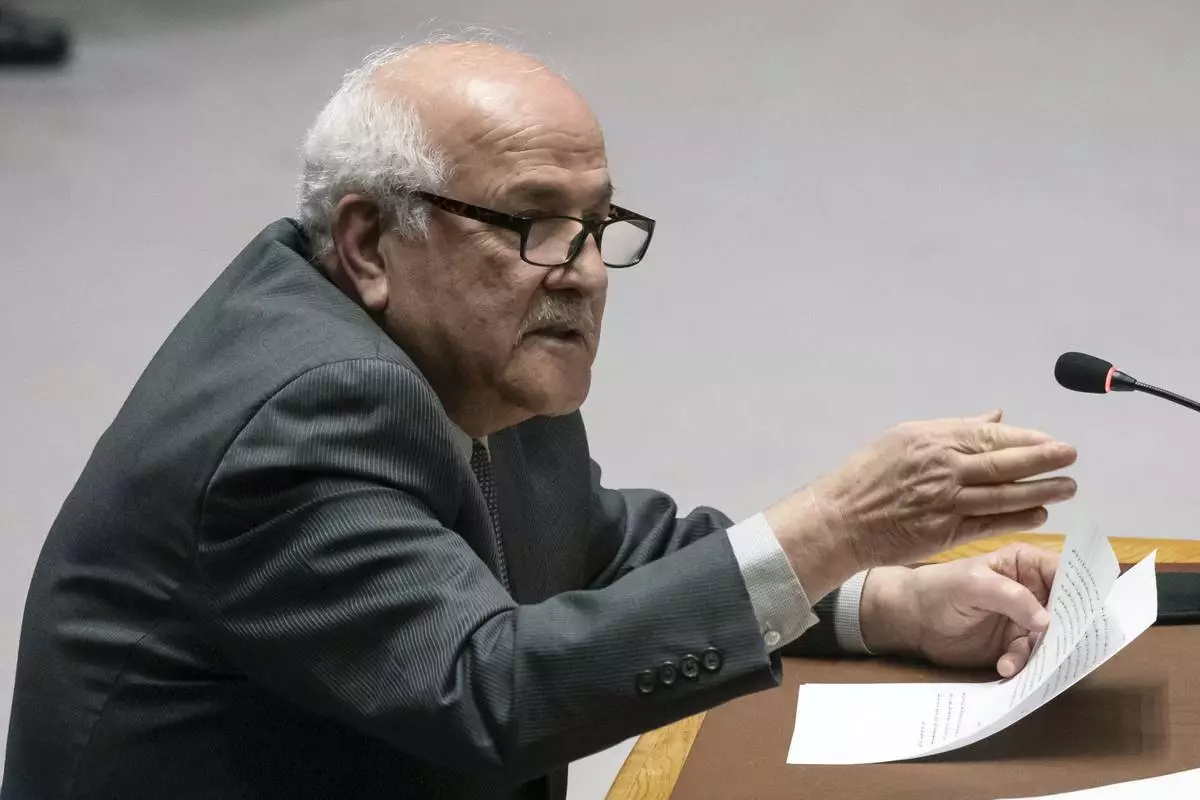
Palestinian Ambassador to the United Nations Riyad Mansour speaks during a Security Council meeting at United Nations headquarters, Thursday, April 18, 2024. (AP Photo/Yuki Iwamura)
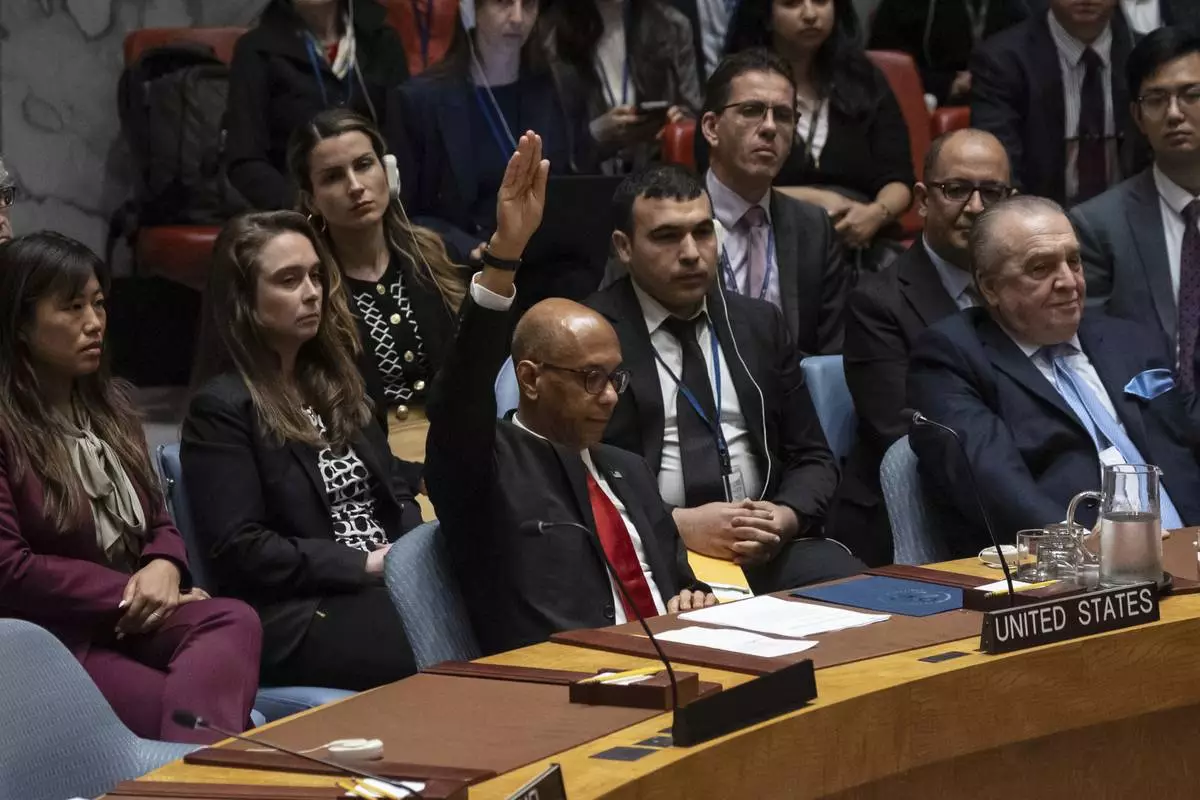
U.S. Deputy Ambassador Robert Wood votes against resolution during a Security Council meeting at United Nations headquarters, Thursday, April 18, 2024. (AP Photo/Yuki Iwamura)



















